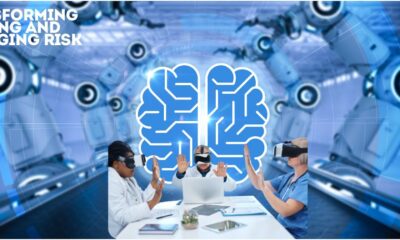Artificial Intelligence
AI-Driven Innovation: The Future of Data-Driven Solutions

We are currently experiencing a remarkable transformation in the world of data. This change, often referred to as the data renaissance, is reshaping how businesses operate and make decisions. It is not just about collecting numbers; it’s about understanding the stories behind them and using those insights to drive innovation. With the rise of artificial intelligence (AI), we are on the brink of a new era where data can be turned into powerful tools for decision-making and growth. This article explores the exciting possibilities that lie ahead in the realm of AI-driven data solutions.
Key Takeaways
- Data is at the heart of modern business innovation.
- AI helps turn raw data into meaningful insights.
- Collaboration between AI and human skills is crucial.
- Real-world applications of AI are transforming industries.
- Future challenges include data privacy and integration.
The Future of Data Solutions
The Data Renaissance
We are witnessing a data renaissance, where data is not just numbers but a vital part of our decision-making. This transformation is reshaping how businesses operate, making data an active participant in their strategies.
Transforming Raw Data into Insights
Data solutions today are dynamic systems that convert raw data into valuable insights. They help businesses understand trends and make informed choices. Here are some key aspects of this transformation:
- Actionable Insights: Data is turned into clear actions that can drive business growth.
- Predictive Analytics: Businesses can foresee market changes and adapt accordingly.
- Enhanced Decision-Making: With better data, companies can make smarter choices.
Technological Marvels on the Horizon
The future is bright with technological marvels that promise to revolutionise data solutions. Some exciting developments include:
- AI Integration: Artificial Intelligence will automate tasks and improve efficiency.
- Cloud Computing: This will allow for better data storage and access.
- Real-Time Analytics: Businesses will be able to make decisions based on live data.
The future of data solutions is not just about managing information; it’s about harnessing it to create opportunities and drive innovation.
In summary, the future of data solutions is about embracing change and leveraging technology to turn data into a powerful asset for businesses. AI-driven innovation will play a crucial role in this journey, making it essential for companies to adapt and thrive in a data-driven world.
The Rise of AI in Data Solutions
AI Revolution in the Data Landscape
Artificial Intelligence (AI) is not just a trendy term; it is a powerful force reshaping the data world. AI is changing how we handle data by automating repetitive tasks and accurately predicting market trends. Its ability to learn from data patterns and adapt to new information makes it essential for businesses today.
Automating Mundane Tasks
AI excels at taking over boring, repetitive tasks, allowing humans to focus on more important work. Here are some tasks AI can automate:
- Data entry and management
- Routine reporting
- Customer service inquiries
Predicting Market Trends
AI can analyse vast amounts of data to spot trends before they happen. This helps businesses make smarter decisions. For example, AI can:
- Identify shifts in consumer behaviour
- Forecast sales trends
- Suggest product improvements
AI is not just a tool; it is a partner in innovation, helping businesses unlock new opportunities.
In summary, the rise of AI in data solutions is transforming how we work with data, making processes faster and more efficient. As AI continues to evolve, its role in data solutions will only grow, paving the way for a more data-driven future.
Deep Diving into AI-Driven Data Insights
The true power of AI is in its ability to turn raw data into valuable insights. Unlike traditional methods that only skim the surface, AI digs deeper, revealing hidden connections and predicting future trends. This means that data can actively shape decisions rather than just inform them.
Uncovering Hidden Correlations
- AI can identify patterns that humans might miss.
- It helps in understanding complex relationships within data.
- Businesses can make informed decisions based on these insights.
Predicting Future Scenarios
- AI uses historical data to forecast outcomes.
- It can simulate various scenarios to aid strategic planning.
- Companies can prepare for potential challenges and opportunities.
Real-Time Decision Making
- AI enables instant analysis of data, allowing for quick responses.
- Businesses can adapt strategies on the fly based on current data.
- This agility can lead to a competitive edge in the market.
In a world where data is abundant, the ability to extract meaningful insights is crucial for success. AI not only enhances this process but also transforms how businesses operate.
Real-World Applications of AI
To understand the impact of AI on data solutions, consider its applications:
- Healthcare: AI predicts patient outcomes and optimises treatment plans.
- Finance: Automated systems detect fraud and personalise banking experiences.
- Retail: AI-driven recommendations and inventory management improve shopping experiences.
- Transportation: AI revolutionises logistics with self-driving technology and smart traffic systems.
AI is not just a tool; it’s a partner in innovation, helping businesses unlock new levels of efficiency and creativity. By embracing AI, companies can navigate the complexities of data and drive their success forward.
Real-World Applications of AI
AI is making a significant impact across various sectors, showcasing its potential to transform industries. From healthcare to finance, AI is revolutionising how we operate. Here are some key areas where AI is being applied:
AI in Healthcare
- AI algorithms are used to predict patient outcomes.
- They help optimise treatment plans.
- AI assists in complex surgeries, improving precision and safety.
AI in Finance
- Automated trading systems enhance efficiency.
- AI detects fraud by analysing patterns in transactions.
- Personalised banking experiences are created through AI-driven insights.
AI in Retail
- Recommendation engines suggest products based on customer behaviour.
- AI helps manage inventory, ensuring stock levels meet demand.
- Predictive analytics shape marketing strategies and customer engagement.
AI in Transportation
- Self-driving cars are changing how we travel.
- Smart traffic management systems reduce congestion and improve safety.
- AI optimises logistics, making deliveries faster and more efficient.
The integration of AI into these sectors not only improves efficiency but also enhances decision-making processes, allowing businesses to respond swiftly to changes in the market.
In summary, AI is not just a tool; it is a catalyst for innovation, driving progress in various fields and creating new opportunities for growth.
The Synergy of AI and Human Expertise
AI as a Tool, Not a Replacement
While AI brings remarkable benefits, it is crucial to understand that it serves as a tool rather than a substitute for human skills. The future of data solutions hinges on the effective collaboration between AI systems and human insight. By merging the analytical strength of AI with human creativity, businesses can achieve new heights of innovation and efficiency.
Harmonious Collaboration
The partnership between AI and humans can be illustrated through several key points:
- Enhanced Decision-Making: AI can process vast amounts of data quickly, providing insights that help humans make informed choices.
- Creativity and Intuition: Humans bring creativity and emotional intelligence, which AI cannot replicate.
- Continuous Learning: AI systems learn from human feedback, improving their performance over time.
Unlocking Innovation and Efficiency
The combination of AI and human expertise leads to significant advancements in various fields. For instance, in healthcare, AI can analyse patient data to suggest treatment options, while doctors apply their judgement to make final decisions. This synergy not only boosts productivity but also fosters a culture of innovation.
In a world where data is abundant, the collaboration between AI and human expertise is essential for unlocking the full potential of data-driven solutions.
By embracing this partnership, organisations can navigate the complexities of the modern data landscape more effectively, ensuring they remain competitive and responsive to change.
Natural Language Processing and Data Insights
Understanding Human Language
Natural Language Processing (NLP) is a fascinating area of AI that helps computers understand and interact with human language. This technology allows us to communicate with data in a way that feels natural. With NLP, businesses can ask questions about their data just like they would ask a colleague. For example, they might inquire, “What were our top-selling products last month?” or “How has customer feedback changed recently?”
Conversing with Data
NLP makes it possible for anyone in a company to engage with data without needing to be a tech expert. Here are some key benefits of using NLP in data solutions:
- Democratisation of Data Analytics: Team members from various departments can access and understand data insights.
- Speed and Efficiency: Quick answers to complex questions without needing to write complicated code.
- Enhanced Customer Experiences: Businesses can use chatbots and voice assistants to interact with customers in a more personal way.
Bridging the Gap
While NLP is powerful, it does face challenges. Language can be tricky, with different meanings and cultural nuances. However, as technology improves, these issues are being tackled. The future looks bright for NLP, as it aims to create a seamless connection between businesses and their data, making it easier to gain insights and make informed decisions.
The potential of NLP is vast, and as it evolves, it will continue to transform how we interact with data, making it more accessible and insightful for everyone.
Future Challenges in Data-Driven Solutions
As we move further into a world driven by data, businesses will face several significant challenges. Understanding these challenges is crucial for success. Here are some key issues:
Data Overload
- The sheer volume of data generated can overwhelm businesses, making it hard to extract meaningful insights.
- Companies may struggle to philtre out noise and focus on what truly matters.
- This can lead to decision-making based on incomplete or irrelevant information.
Data Privacy and Security
- With data being a valuable asset, it is also a target for cyberattacks.
- Protecting sensitive information is essential to maintain customer trust.
- Businesses must invest in robust security measures to safeguard their data.
Data Integration
- Integrating data from various sources can be complex, especially with the rise of IoT devices.
- Companies need to ensure that data flows seamlessly across platforms.
- This requires advanced tools and strategies to manage diverse data streams.
Regulatory Compliance
- Stricter data regulations are emerging globally, making compliance a top priority.
- Businesses must stay updated on laws to avoid penalties and maintain their reputation.
- This often involves significant changes to data handling practises.
The future of data-driven solutions will depend on how well businesses can navigate these challenges while leveraging data effectively.
By addressing these issues head-on, companies can turn potential obstacles into opportunities for growth and innovation.
| Challenge | Description | Impact on Business |
|---|---|---|
| Data Overload | Excessive data can lead to confusion and poor decision-making. | Reduced efficiency and missed opportunities. |
| Data Privacy and Security | Increased risk of cyberattacks on valuable data. | Loss of customer trust and potential fines. |
| Data Integration | Difficulty in merging data from various sources. | Inconsistent data and delayed insights. |
| Regulatory Compliance | Need to adhere to new data regulations. | Increased operational costs and risks. |
Innovative Solutions for Data Challenges

In today’s fast-paced world, businesses face numerous data challenges. However, innovation can turn these challenges into opportunities. Here are some effective solutions:
Advanced Data Management Platforms
- These platforms help manage large volumes of data, ensuring it is well-organised and easy to access.
- They allow businesses to turn raw data into actionable insights, making decision-making smoother.
- Examples include cloud-based solutions that offer scalability and flexibility.
Enhanced Security Protocols
- With data becoming a prime target for cyberattacks, robust security measures are essential.
- AI-driven threat detection can help identify and neutralise potential risks before they escalate.
- Implementing blockchain technology can ensure data integrity and transparency.
Unified Data Integration Tools
- These tools allow businesses to combine data from various sources seamlessly.
- They ensure that data is consistent and available in real-time, which is crucial for timely decision-making.
- This integration helps in creating a comprehensive view of business operations.
In the realm of data, the right tools can make all the difference. By adopting innovative solutions, businesses can not only tackle current challenges but also prepare for future demands.
By embracing these innovative solutions, companies can navigate the complexities of the data landscape more effectively, ensuring they remain competitive in an ever-evolving market.
Outsourcing Data Solutions
On-Demand Expertise
Outsourcing data solutions allows companies to tap into global talent pools. This means businesses can find the right skills and knowledge without being limited by location.
Economic Intelligence
By outsourcing, firms can reduce traditional costs and focus on value-driven engagements. This approach helps in achieving cost efficiency while maintaining high-quality outputs.
Agile Flexibility
Outsourcing provides the ability to quickly adjust resources based on project needs. This flexibility is crucial in a fast-changing market, allowing companies to scale up or down as required.
Strategic Focus
When companies outsource data solutions, they can concentrate on their core capabilities. This enables them to innovate and improve their services while relying on external expertise for data management.
Key Benefits of Outsourcing Data Solutions
- Access to specialised skills
- Cost savings through efficient resource management
- Increased focus on core business activities
Outsourcing data solutions is not just a trend; it’s becoming a strategic necessity for businesses aiming to thrive in a competitive landscape.
Conclusion
In summary, outsourcing data solutions offers numerous advantages, including access to expertise, cost savings, and the ability to focus on innovation. As businesses continue to evolve, this approach will play a vital role in their success.
Data Leadership for the Future
Governance and Compliance
Effective data leadership starts with strong governance and compliance. Leaders must ensure that data practises meet regulatory standards and protect sensitive information. This involves:
- Establishing clear data policies.
- Regularly reviewing compliance measures.
- Training staff on data protection.
Engineering and Architecture
Data leaders should focus on the technical design of data systems. This means:
- Viewing every challenge as an opportunity to automate.
- Reusing existing solutions to save time and resources.
- Scaling systems to handle growing data needs.
Business Value
Finally, leaders must concentrate on generating business value from data. This includes:
- Identifying ways to use data for revenue growth.
- Collaborating with business teams to align data strategies with company goals.
- Measuring the impact of data initiatives on overall performance.
Data leadership is not just about managing data; it’s about unlocking its potential to drive innovation and efficiency.
In summary, successful data leadership requires a blend of governance, engineering, and business acumen. By focusing on these areas, leaders can ensure their organisations are well-prepared for the future of data-driven solutions.
| Area of Focus | Key Actions |
|---|---|
| Governance and Compliance | Establish policies, review measures, train staff |
| Engineering and Architecture | Automate, reuse, scale |
| Business Value | Identify revenue opportunities, collaborate, measure impact |
Charting a Path to a Data-Driven Enterprise
Data Ubiquity by 2030
By 2030, many businesses will achieve data ubiquity, meaning that data will be everywhere and easily accessible. Employees will have the latest information at their fingertips, embedded in systems and processes that drive automated actions. This shift will require companies to rethink how they manage and use data.
Automated Actions with Human Oversight
To ensure that automated actions are effective, there must be sufficient human oversight. This means that while machines can handle many tasks, humans will still play a crucial role in decision-making. Companies need to establish clear guidelines on how to balance automation with human input.
Essential Priorities for Leaders
To successfully navigate this transition, leaders should focus on several key priorities:
- Governance and Compliance: Ensure that data is managed according to regulations and best practises.
- Engineering and Architecture: Design systems that are scalable and efficient, allowing for easy data access and use.
- Business Value: Focus on how data can drive revenue and growth, ensuring that data initiatives align with business goals.
In the journey towards a data-driven enterprise, it is essential to build a culture that values data and encourages its use across all levels of the organisation.
By addressing these priorities, companies can create a robust framework that supports their data-driven ambitions and prepares them for the future.
Conclusion
In conclusion, the future of data-driven solutions is bright, thanks to the rise of AI. As we move forward, businesses will increasingly rely on AI to turn raw data into useful insights. This transformation will not only help companies make better decisions but also drive innovation across various industries. However, it’s important to remember that while AI is a powerful tool, it works best when combined with human creativity and judgement. By embracing this partnership, organisations can unlock new opportunities and navigate the challenges of a data-rich world. The journey ahead is filled with potential, and those who adapt will thrive in this exciting landscape.
Frequently Asked Questions
What is AI-driven innovation?
AI-driven innovation refers to the use of artificial intelligence to create new ideas, products, or processes that improve efficiency and effectiveness.
How does AI help in data analysis?
AI helps by quickly processing large amounts of data, finding patterns, and providing insights that humans might miss.
What are some examples of AI in real life?
AI is used in various fields like healthcare for predicting patient outcomes, in finance for fraud detection, and in retail for personalising shopping experiences.
Will AI replace human jobs?
AI is more likely to change jobs rather than replace them. It can handle repetitive tasks, allowing humans to focus on more complex and creative work.
What challenges do businesses face with data?
Businesses often struggle with data overload, ensuring data privacy, and integrating data from different sources.
How can companies ensure data security?
Companies can enhance data security by using advanced technologies, setting strict access controls, and regularly updating their security measures.
What is the importance of data in decision-making?
Data is crucial for making informed decisions, as it provides evidence and insights that can guide strategies and actions.
How can small businesses benefit from AI?
Small businesses can use AI to automate tasks, improve customer service, and gain insights that help them compete with larger companies.
-

 Home and Garden5 days ago
Home and Garden5 days agoTransform Your Space: A Guide to Minimalist House Interior Design in 2025
-

 Home & Family5 days ago
Home & Family5 days ago10 Essential Cleaning Hacks for Bathroom Surfaces You Need to Try
-

 Health & Fitness5 days ago
Health & Fitness5 days agoDiscovering the Best Multivitamin for Women Over 40: Essential Nutrients for Optimal Health
-

 Crime5 days ago
Crime5 days agoExploring the Most Anticipated New True Crime Documentaries of 2025
-

 Health & Fitness5 days ago
Health & Fitness5 days agoDiscover the Best Multivitamin for Women Over 40: A Comprehensive Guide to Optimal Health
-

 Business5 days ago
Business5 days agoMaximize Your Earnings with American Express High Yield Savings Accounts in 2025
-

 Automotive4 days ago
Automotive4 days agoUnlocking Performance: Why the HP Spectre x360 is the Ultimate 2-in-1 Laptop for 2025
-

 Artificial Intelligence5 days ago
Artificial Intelligence5 days agoBreaking Generative AI News: Innovations Shaping the Future of Technology






































